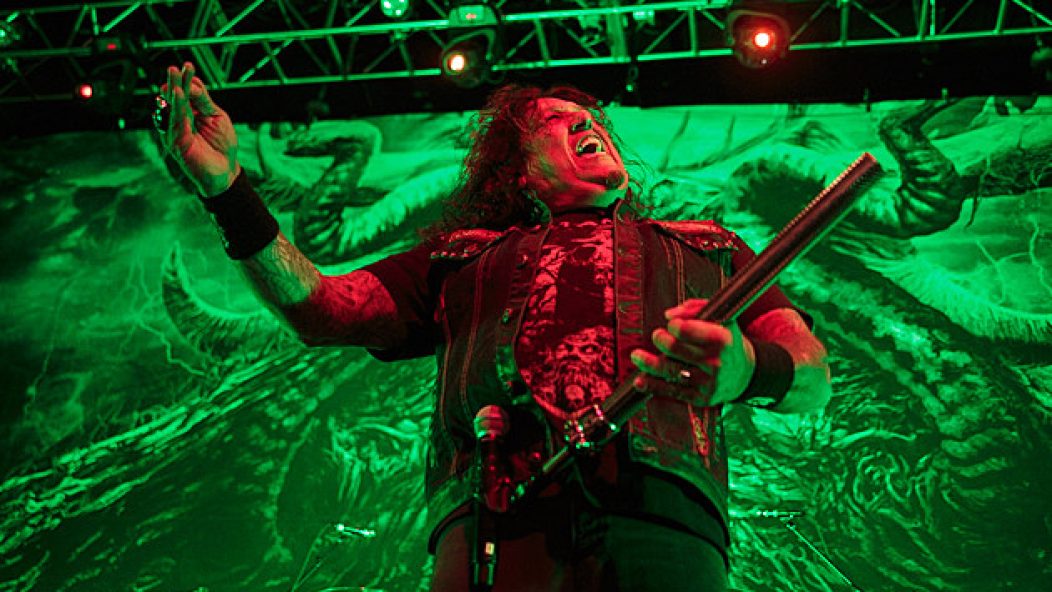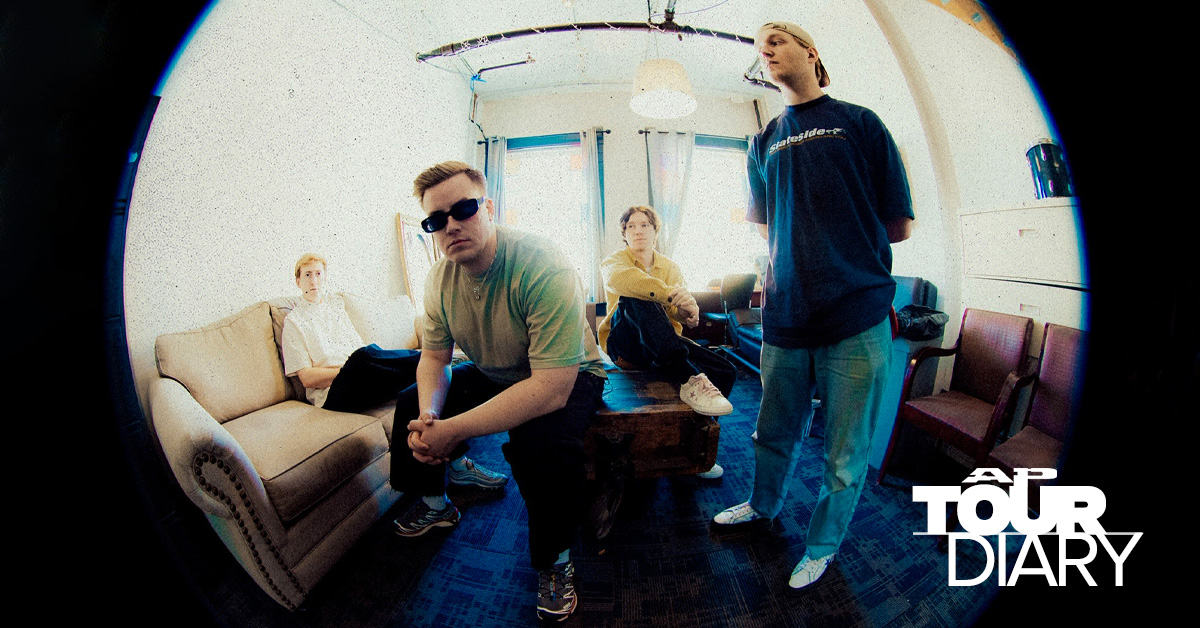
Interview: Chuck Billy (Testament)
…
Always the bridesmaid, never the bride. Bay Area thrash titans Testament never quite got their due, and unlike Anvil they never needed a silly documentary to make themselves relevant again. Now safely ensconced in the stable of touring acts that still put out new records with some regularity, Chuck Billy and his cohorts might seem safe and reliable.
Then again, on second listen, Testament never made the safest decisions–their death metal shift in the mid ’90s was careerist, yes, but not safe by any means. The most reliable thing about them, to my ears, has been their improvement. 2013’s Dark Roots of the Earth is no-bullshit by favorite Testament album. They’ve taken their sweet time following it up, but a new record is on the horizon following their current touring slot sandwiched between Carcass and Slayer (side note: has Slayer ever been so thoroughly outclassed on a bill before?).Check our review from yesterday here.
Billy spoke with us about his near-death experience, the as-yet untitled new album and more.
…
…
You’re about to go out on tour with Slayer, which is interesting but I think perhaps what’s more interesting is you’re going on tour with Carcass as well. You’ve been able to, through the bands that you tour with and through the course of your career, bridge the accessible and more extreme metal gap. I was wondering if you could speak to that for just a moment.
As far as Testament bridging the gap between more accessible music? I think that’s definitely what always has. Testament sounded different from 1985 on. We started our career trying to be playing thrash metal but always trying to put a melodic twist in it or always trying to put a hook into it. I think in our earlier years we’ve developed that and I think it’s stuck with us, especially with me as a vocalist trying to keep it heavy but keep some melody and hook in it. I think after almost 30 years we finally have figured out what’s working now for us.
I certainly think so. Dark Roots of the Earth is one my favorite Testament records. It’s rare for someone to do something so well later on in their career. That’s not the accepted storyline, right?
Yeah. I think especially in our case, I don’t know why, but I think all of us individually and as a band we’ve really aged like wine. I can speak for myself. I know I’m definitely singing better, better control vocally than I had when I was younger. I don’t know what it is. I don’t know if it’s the confidence. Like anything you do in life, you work out and body build you’re going to be pretty muscular. It’s like by singing thrash and writing and doing this kind of stuff I’ve developed what I do.
Speaking of people who have done very well for themselves later in their career, out of curiosity, have you heard the new David Bowie record? The last one he did before he died?
I haven’t, but I’ve been seeing it on the news and I can see the billboards the number one record right now. I’d love to hear it.
It’s really spectacular.
That’s what I heard. I heard it’s his best of what he’s done in a long time.
I think that’s probably about right. I think that staring death in the face did well for him. I also think it did well for Lemmy because I love the last Motorhead record. I think that’s the best one they also did in probably at least a decade. I know that you had your own personal battle with cancer before Dark Roots of the Earth came out. Do you think there’s some truth to that?
Now that you bring it all up, yeah. I think so. I definitely wrote lyrics outside the box that I did as far as my Native American roots. I really hadn’t dug into that and dealing with cancer and stuff like that. I hadn’t really written a lot about that. It’s a little more influential on the record, more personal.
Honestly, for me that record because when I was ill, on The Gathering and at that point of my life, we were weekend warriors. We had so many people coming in and out of the band that we weren’t touring a lot. Well, we were on tour, but not a lot. When I got sick and we had the reunion, it changed me because when I was ill, I looked in the mirror and I thought my career was over. I didn’t recognize myself. I just lost all my hair and just wasn’t the same person. I thought, “That’s it. I’m done.”
When we had the reunion and all of the original guys came back it was a breath of fresh air. It was like, “Wow, I’m blessed that I’m getting a second chance with the original guys and I’m going to do it.” We did it and did that record [The Formation of Damnation]. It was like, “Wow, maybe all that together . . . energy, everything about it came through.”
I think you’re correct that something at that point in life brings something out of you, I guess, when you don’t know the outcome of life or death.
I appreciated that you dealt with your Native American heritage a little bit on that album. I’m half Brazilian, and that’s one of the reasons why I have this incredible affinity for “Sepultura” is that it meant a lot to me there was someone exploring that. Have you continued since then to think about your heritage and your ancestry in your everyday life?
For sure. Now, I do definitely. I was born and raised a Catholic and that whole route. When I went through my illness, doing a lot of Native healing and stuff like that definitely gave me a whole outlook of spirituality, just life and the planet more. I look at things and absorb our world more than I did before my illness. That’s for sure.
What do you think of the phenomenon of white music fans wearing Native American fashion. I know it doesn’t happen in metal shows so much, but at some more mainstream shows there’s this phenomenon of young, Caucasian people appropriating Native American garb, clothing as a fashion sense. People are reacting to that. I was wondering if you ever thought about that or if you had any emotions about that phenomenon.
I don’t know what form of fashion you’re talking about. Are you talking turquoise and jewelry and that kind of stuff?
Specifically people wearing headdresses tastelessly.
I don’t know. I haven’t seen any people wear headdresses. I don’t know. I just don’t know about that. I don’t know how to take that. To me, how would a German take to someone wearing a Nazi helmet or something like that? I don’t know.
It’s probably a good time to talk about what’s on the future for Testament after this tour because it’s been what, three years since Dark Roots of the Earth?
Yeah, we’ve been working on it for a while now. We’re a band that don’t write a lot of songs and pull songs from the last writing session and put them on the new records. We always write from scratch for the new records. We just haven’t found our stride for the last, shit, year maybe trying to get the record done.
Probably in the last three or four months Eric [Peterson, guitar] just came up with a lot of music. We’re at that point where it’s down to me now getting a lot of the vocals done. Eric and Gene [Hoglan, drums] actually just recorded a single this weekend that we’re going to try to get released before or during the tour. Give everybody a taste of the new record. As soon as we finish that tour, because we’re going to have a lot of time on this tour, we’re going to try to really get the vocals done. We’re going to bring some recording equipment out on the road and just work on some vocals and get that done.
When we get home, we’re going to go right in the studio and hopefully track the rest of the record and get it done before summer, around June. That will give us a couple months to get the record recorded and mixed.
What can you tell me about the new material? Is it more of an old-school vibe or a continuation of what you’ve been doing the last time?
I don’t think it’s a continuation. I think the beauty of Eric, he doesn’t go “What did I do last time? Let me see.” I think that’s the beauty of all Testament’s records is that the mold is always changing. It’s not just all of the same mold. The songs, again, they feel new to me and fresh like they’re a challenge. I’m still trying to find my way through some of these patterns of the vocals which is a challenge. It’s always a pain in the ass, too. I hate it, but we’re at that point right now. We’re at the end of the vocals now. I think once I get off the road after this tour I’m going down to LA and work with Dell Jeans [SP], a guy I’ve been working with for about 15 years now,. I’ll spend some time down there nailing out some vocal lyrics before I hit the road on the tour.
Lyrically, where are you coming from on this as yet unnamed new project?
I’m really into the earth and the planet which I think you probably know Testament always has been. Our planet is going the wrong way. We’re getting worse. I’m fascinated by the aliens being here, religion, some fascinating shows I’ve seen have just caught my attention and stuff like that. A lot of the record we’re going back to looking at a lot of secret societies. I don’t want to give our record title away yet, but it has to do with some secret societies. It ties in with our earlier alien stuff on the planet. We’re going all over the place on it. It’s kind of cool.
It sounds interesting. Matt Pike is interested in a lot of that same stuff as well.
I know. Exactly. I’ve seen one of his interviews. “Hey, he’s thinking the same thing I am, we are. Shit.” That doesn’t matter. We’re not going to write the same songs. Same concept and ideas. It’s really interesting. I’m fascinated by that right now. And of course, Eric is into Vikings and stuff. He wants to write Viking songs.
That’s cool. Vikings are having sort of a cultural resurgence in America right now. One thing I did want to talk about is you’ve made in some sense a name for yourself not only as a great metal musician but as a great businessman, someone who’s been able to survive all the changes in the industry, and the transition from vinyl to CD and now from CD to digital. How do you feel about the state of the industry right now?
I do see declining of record sales even more and more. I follow a lot of sound scans and watch the trends. It’s sad, but you see that it is still happening. I think concert goers though are still strong. You see bands that the records aren’t selling, but they’re selling out a lot of bigger venues. That doesn’t make sense. That doesn’t make sense at all.
It’s different seeing where the climate’s going. I don’t know what it’s going to take, maybe something new out there that’s going to get the fans to go and buy. I think seeing vinyl resurgence come back was great for me to see. For me, when I was a kid, that’s part of [the process] getting the vinyl and getting this whole big artwork in it and reading all of the lyrics. Now on a CD you can’t read the lyrics on that damn thing. It’s too small. You can’t see it. It’s not as enjoyable as it was in the past. I don’t know. Maybe they can come out with a record, CD, digital download all in one package to get people to get it all. Get the cool package and make people go out and buy stuff.
I was reading this morning about Black Sabbath doing their farewell tour. One of the things they said is that they’re pulling out a lot of deep cuts which made me happy because I’m ordering tickets. I’m going to go see it.
I’m going in September. They’ve got mine.
Good. Are there some Testament deep cuts that you’d really like to play live that you guys haven’t played in a long time? That’s an interesting topic of conversation.
There definitely are. There’s a lot of deep cuts that we love as a band that we love to play, but they’re probably so obscure. It all depends. We do a headline set we’ll do that because we can. When you’re supporting somebody, you can never get that opportunity. It goes over their head. You’ve got to stick with what they know.
Yeah, but what specific songs do you think are some great, not so well known Testament tunes?
For me, “Curse of the Legions of Death” for us is a real deep cut. Songs like “Trial by Fire,” we’ve played that forever. “Day of Reckoning,” songs like that. “Practice What You Preach.” We haven’t done those ballads, shit, in a long time. I think people would trip on that if we pulled out a ballad.
I like ballads. That’s one of the things that I’m sad to have seen go as metal has gotten more extreme. I like extreme metal, but my favorite Pantera songs were always the ballads. My favorite Metallica songs were always the ballads, and I think that’s an art that’s been lost, I’m sorry to say, or at least is not as prominent as it was.
We’re at our stage in our life where we’re comfortable to do it because we’ve done a lot but I’ve seen a lot of new younger bands say, “They think we’re selling out or being a pussy.” You know what I mean? I guess it all depends on where you’re at or how comfortable you are doing it and stuff like that.
I suppose. What do you think makes a good ballad?
Definitely a great story.And you can get a big, giant drum sound when it’s slow or it’s not playing real fast and thrashy. Big drums, big guitars. I love when you feel a different mood to the [singer]. Like me, I’ve got three voices I can do — the death, or the pitchy rock voice or the cleaner “ballady” voice. I get to do something different.
Come to think of it, you’re one of the only, if not the only, classic style metal singer who’s added the death vocals in. I don’t know if I can think of anyone else from the thrash era or earlier who has adapted that. I guess for a minute there Rob Halford got a bit abrasive.
I was about to say, Halford did a little bit for a minute.
…








![Bad Omens announce new album CONCRETE JUNGLE [THE OST]](https://www.altpress.com/wp-content/uploads/2024/04/17/BadOmens-CROP_2024_JW_0619_Final_V1.jpg)


